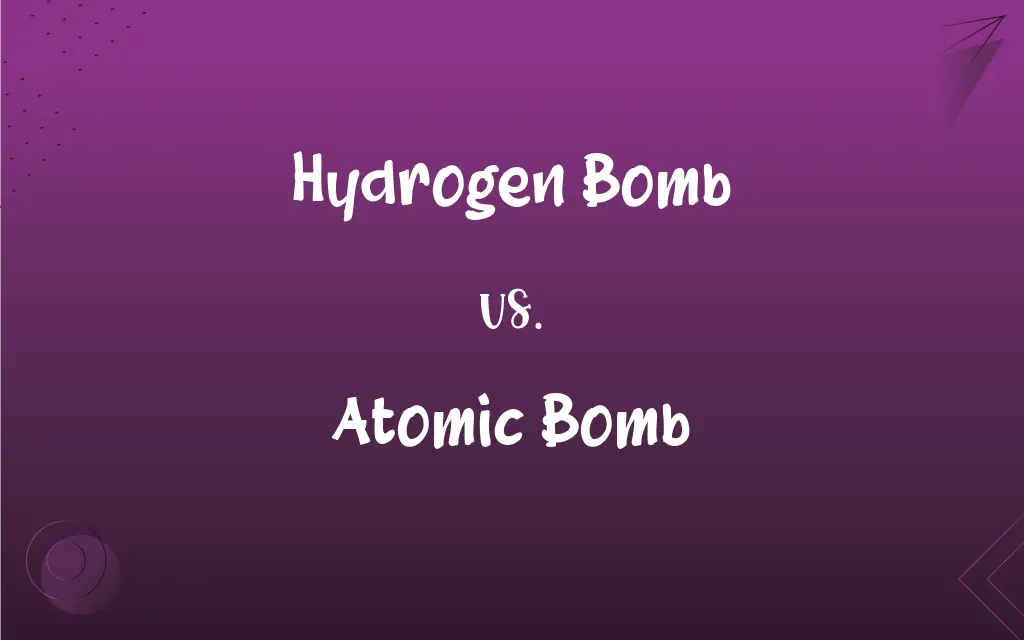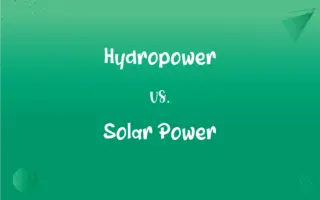Hydrogen Bomb vs. Atomic Bomb: What's the Difference?
Edited by Aimie Carlson || By Harlon Moss || Updated on October 17, 2023
Hydrogen bomb uses fusion of hydrogen isotopes for a massive blast; atomic bomb uses fission of heavy elements like uranium or plutonium.

Key Differences
The hydrogen bomb, also known as the thermonuclear bomb, works on the principle of nuclear fusion, where high temperatures cause hydrogen isotopes to combine, releasing immense energy. In contrast, the atomic bomb operates on nuclear fission, where heavy atomic nuclei like uranium or plutonium are split, which also releases substantial energy but significantly less than its hydrogen counterpart.
The development of the hydrogen bomb was partly due to the limitations in the destructive power of the atomic bomb. The latter, though immensely destructive, doesn't match the explosive force that a hydrogen bomb can produce, which can be thousands of times stronger. This difference marks a significant escalation in terms of the potential for destruction and subsequent humanitarian impact.
In terms of construction, the hydrogen bomb is more complex, requiring a two-stage process of detonation. It often uses an atomic bomb as its first stage to create the extreme temperatures necessary for the fusion in the second stage. The atomic bomb, on the other hand, is a simpler, single-stage device that doesn't require the high temperatures needed for fusion reactions.
From a historical perspective, the atomic bomb was used during World War II, marking the only instances of nuclear weapons used in armed conflict, and demonstrating their catastrophic potential. The hydrogen bomb, developed later, has fortunately never been used in warfare, partly due to the understanding of the incomprehensible devastation it would cause.
In terms of international relations and policy, the existence of the hydrogen bomb has contributed to the concept of mutually assured destruction (MAD), a form of deterrence predicated on the idea that the use of high-yield thermonuclear weapons by two or more opposing sides would result in the complete annihilation of both the attacker and the defender. The atomic bomb, while also a part of this doctrine, doesn't possess the same level of destructive guarantee.
ADVERTISEMENT
Comparison Chart
Mechanism
Fusion of hydrogen isotopes
Fission of heavy elements (uranium/plutonium)
Explosive Power
Higher (thousands of times stronger)
Lower
Complexity
More complex, two-stage process
Simpler, single-stage
Historical Usage
Not used in warfare
Used in warfare (WWII)
Policy Impact
Contributes to mutually assured destruction (MAD)
Part of MAD, less destruction
ADVERTISEMENT
Hydrogen Bomb and Atomic Bomb Definitions
Hydrogen Bomb
A weapon contributing to the MAD doctrine.
The development of the hydrogen bomb has significantly influenced nuclear policies worldwide.
Atomic Bomb
A nuclear weapon that uses fission to release energy.
The detonation of an atomic bomb over Hiroshima changed the course of history.
Hydrogen Bomb
A complex, two-stage nuclear weapon.
The intricacy of the hydrogen bomb's design involves a primary fission reaction triggering a secondary fusion reaction.
Atomic Bomb
An explosive device using uranium or plutonium.
The critical component of an atomic bomb is fissile material like uranium-235 or plutonium-239.
Hydrogen Bomb
The most powerful explosive device known.
The hydrogen bomb's destructive capacity is unrivaled, causing global concern.
Atomic Bomb
A historical catalyst for global nuclear disarmament movements.
The aftermath of the atomic bomb drops in 1945 sparked a continuous debate and push for nuclear disarmament.
Hydrogen Bomb
A thermonuclear weapon with extreme destructive power.
The test of the hydrogen bomb resulted in an unparalleled explosion.
Atomic Bomb
A weapon of mass destruction used in WWII.
The use of the atomic bomb in warfare has only been recorded during the tragic events of World War II.
Hydrogen Bomb
A nuclear device that uses fusion to release energy.
Scientists differentiate a hydrogen bomb from other nuclear devices based on its fusion process.
Atomic Bomb
A simpler, single-stage nuclear device compared to thermonuclear weapons.
Despite its devastating power, the atomic bomb employs a less complex mechanism than the hydrogen bomb.
FAQs
What principle does an atomic bomb work on?
An atomic bomb works on nuclear fission, splitting heavy atomic nuclei to produce a large explosion.
How does a hydrogen bomb create an explosion?
A hydrogen bomb uses nuclear fusion, combining hydrogen isotopes under high temperatures, resulting in a massive explosion.
Were atomic bombs used in warfare?
Yes, atomic bombs were used twice in warfare, both times by the United States during World War II.
How did the invention of the atomic bomb affect international relations?
It led to the nuclear arms race, Cold War tensions, and profound changes in global defense policies.
Why was the hydrogen bomb developed after the atomic bomb?
The hydrogen bomb was developed to achieve greater destructive power, overcoming the limits of the atomic bomb's fission process.
Has a hydrogen bomb ever been used in war?
No, a hydrogen bomb has never been used in armed conflict, only tested.
Were the citizens aware of the development of the atomic bomb during WWII?
No, the Manhattan Project, which developed the atomic bomb, was a highly classified program.
What is the role of the atomic bomb in modern national defense?
It's often a central element in a country's deterrence strategy, intended to prevent attacks by posing a potential nuclear response.
What would be the environmental impact of detonating a hydrogen bomb compared to an atomic bomb?
A hydrogen bomb would cause significantly more severe environmental damage, including higher radiation levels and broader ecological impact.
What's the difference in destructive power between a hydrogen bomb and an atomic bomb?
A hydrogen bomb has a much higher destructive power, potentially thousands of times more than an atomic bomb.
Are there treaties controlling the proliferation of atomic bombs?
Yes, treaties like the Non-Proliferation Treaty aim to prevent the spread of nuclear weapons.
How did the introduction of the atomic bomb impact military strategy?
It led to the development of deterrence theory and a shift towards preventing nuclear conflict through diplomacy and arms control.
How has the atomic bomb influenced peace movements globally?
It's significantly fueled movements advocating for disarmament, non-proliferation, and peaceful conflict resolution.
What are the humanitarian impacts of using an atomic bomb?
Immediate and long-term civilian casualties, environmental devastation, and lasting health issues due to radiation.
How does the complexity of a hydrogen bomb compare to an atomic bomb?
A hydrogen bomb is more complex, often using an atomic bomb to initiate the fusion process.
Why aren't hydrogen bombs used in warfare?
The catastrophic destruction they would cause prevents their use, under the principles of deterrence and mutually assured destruction.
How do international communities view the testing of hydrogen bombs?
It's generally condemned, viewed as provocative, and against international efforts for disarmament and non-proliferation.
What materials are used in atomic bombs?
Atomic bombs use fissile materials like uranium-235 or plutonium-239 to initiate the fission reaction.
What is the concept of "mutually assured destruction" related to these weapons?
It's the idea that the use of nuclear weapons by opposing sides would result in the complete destruction of both, preventing their use.
Why is the hydrogen bomb considered more dangerous than the atomic bomb?
Its higher explosive power leads to far greater destruction and subsequent humanitarian consequences.
About Author
Written by
Harlon MossHarlon is a seasoned quality moderator and accomplished content writer for Difference Wiki. An alumnus of the prestigious University of California, he earned his degree in Computer Science. Leveraging his academic background, Harlon brings a meticulous and informed perspective to his work, ensuring content accuracy and excellence.
Edited by
Aimie CarlsonAimie Carlson, holding a master's degree in English literature, is a fervent English language enthusiast. She lends her writing talents to Difference Wiki, a prominent website that specializes in comparisons, offering readers insightful analyses that both captivate and inform.































































